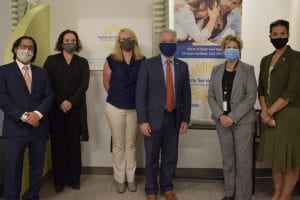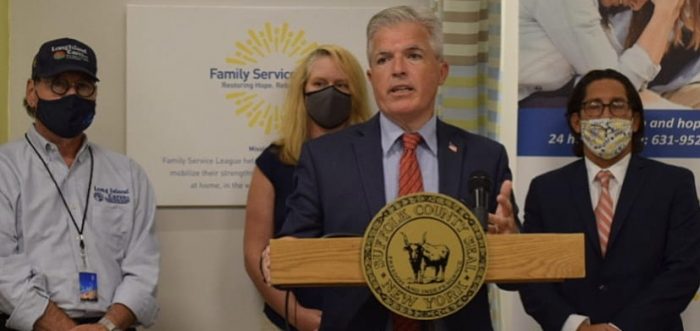Bellone: Suffolk Needs $400M in Federal Relief to Prevent Healthcare Cuts
Suffolk County Executive Steve Bellone (D) announced this week that the county will have no choice but to make catastrophic budget cuts to contract agencies that receive county funding if federal funds don’t come in.

In a press conference at the Hauppauge-based Diagnostic, Assessment, and Stabilization Hub Wednesday, Sept. 30, Bellone said services like DASH, which offers drug and family emergency care, could face serious consequences if the federal government doesn’t get involved.
The conference was one in a series of pleas to top federal representatives to send aid to local governments as the impending budget crunch draws near.
“We’re still grappling with the virus’ impacts and aftermath within our community,” he said. “There’s too much riding on this for Washington to not get involved.”
Through federal inaction, Suffolk County will be forced to slash funding at unprecedented levels for agencies that provide services for the most vulnerable, according to Bellone. Along with the county executive, heads of several organizations stood by, explaining how the federal cuts could affect the help they provide to the community.
Healthcare and mental health services, addiction and domestic violence help and even safe childcare are in need of funding to keep going.
“Not-for-profits are the fabrics of our community,” Karen Boorshtein, president and CEO of the Family Service League, said. “Without them, everyone is going to suffer.”
Paule Pachter, CEO Long Island Cares, said that his organization, which brings resources to help feed the hungry on Long Island, has seen huge increases in people waiting in line for food.
“Priorities in the USA are completely unacceptable,” he said. “110,000 [hungry] people, an additional 50,000, will become part of the lasting effects if Washington doesn’t take this seriously.”
Representatives from the Child Care Council of Suffolk, the Long Island Council on Alcoholism and Drug Dependence and L.I. Against Domestic Violence all said they’ve experienced drastic increases in service inquiries during the pandemic.
Colleen Merlo, executive director of LIADV, said the road to recovery for survivors of domestic violence will be painful and slow, especially without federal aid.
“We’ve been up 31% in calls,” she said. “Counseling services have doubled.”
Executive director of LICADD, Steve Chassman, said because of the COVID-19 crisis, addiction numbers have skyrocketed.
“We have propelled to where we were 6 months ago,” he said.
Bellone made a direct appeal to President Trump requesting that he call upon U.S. Senate Majority Leader Mitch McConnell to pass a federal disaster assistance bill in the U.S. Senate to prevent these potential devastating cuts.
He said he’s been working alongside counties throughout the state who all agree help is needed.
“This isn’t partisan, and it shouldn’t be,” he said. “Politics has no place there.”
Earlier this year, Bellone created a COVID-19 Fiscal Impact Task Force to conduct an independent review of the county’s multi-year plan and the true impact to the pandemic. The report found that Suffolk County could face a cumulative budget shortfall of up to $1.5 billion over the next three years because of the economic fallout of the pandemic.
Bellone said the county will need nearly $400 million in federal relief this year to avoid these “devasting” cuts that “should not happen.”
“We’ve seen incredible strength and compassion, while also dealing with pain and trauma,” he said. “We’ve been up and down the mountain, we’ve flattened the curve, and we’ve done that by coming together, supporting each other, and that’s what we have to do if we’re going to recover.”







